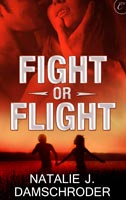Guest Post: The Ambiguous Ending
Guest post by Natalie Damschroder
I have never really been a fan of the ambiguous ending. You know the kind, where the author or, more commonly, filmmaker leaves the truth up to the audience. I saw a movie this weekend (won’t name it because I don’t want to spoil it) that I knew was the kind to have such an ending, but even knowing that, I held my breath through the climax, so eager to see the happy ending we’d been fighting for right along with the characters. And then we got it. And then…they made us question. Did we? Did he?
I admit, I screamed. (Almost silently, as it was well after midnight. Hurt my throat!) I understood what the filmmaker was doing, and it fit the themes of the movie. But he did his job too well. The best movies are marriages of spectacle and character, conflict and special effects. This one made us care so much about the hero that it really damaged my pleasure when they called into question everything we’d just seen.
In popular fiction — romance, sci-fi, fantasy, mystery, thriller — the ending is rarely ambiguous. The couple is together, the bad guy caught or dead, the world recovering from whatever battles have been fought. But once in a while, the author leaves it up to the reader to decide what happens next. As a reader, I don’t like that. Not because I’m incapable of making that determination, but because it makes things feel unfinished. I like to know. The characters are only real because of the author, so I want to know what the author knows!
I’m struggling with a manuscript right now that, in first draft, ended a bit ambiguously. It’s a happy ending, but there’s one factor that isn’t shown on the page, the results aren’t told. It feels right to end it that way, but I don’t like it!
So what do you think? Movies, books, TV show cliffhangers that leave unanswered questions…where do you stand? Hate them, love them, or somewhere in between?
Even if you don’t want to voice an opinion, leave a comment for a chance to win a copy of Naked, a Harlequin Spice by Megan Hart.
Natalie J. Damschroder’s latest romantic adventure, Fight or Flight, is available now from Carina Press, via Amazon and Barnes and Noble, and wherever e-books are sold. It’s also available in audiobook! Her next book in this genre, Behind the Scenes, will be out late this year.
You can learn more about Natalie and her books at her website, eHarlequin, Goodreads, Twitter, and Facebook. She blogs with three other opinionated writers at The Gabwagon, and with four other obsessed passionate Supernatural fans at Supernatural Sisters.



I like all kinds of endings. Well, except the ones that just don’t work: the twist ending you saw coming a mile away, the happy ever after that just doesn’t ring true, or the ambiguous ending that is more ‘what the hell???’
Yeah, anything forced makes for a bad ending, and all three of those examples, when they don’t work, it’s usually because the ending is forced.
Congratulations, Diane, you won the book! 🙂 E-mail me at nujii @ aol . com (no spaces) with your address, and I’ll get that in the mail asap. Thanks!
I don’t mind them, but the thing is the writer leaves it up for discussion and makes the reader have to really analyze the work to come up with the right, if there is one, ending. Take for instance ” Rain ”
By Maugham. All the movies have Davidson commit suicide, but really, do men like him really do that? Maugham uses the same character Sadie, who also appears in “Rain”, in another work, who’s life is ended the same way only she is murdered. It is the last statement in Rain… “He understood” that makes “Rain” ambiguous to me. Now I have to prove it in a response paper, wish me luck!
Take a look, do you buy the movie version or do you think he could have been murdered by Sadie or someone else?
Endings are always crucial – I HATE it when I’ve got to the end of a book, only to find that the main storyline hasn’t been fully completed, for one reason or another – often, these days, because it is a multi-book series and the author has left the story on a cliffhanger. While I think it’s fine to have several plotlines dangling, I believe the writer is in danger of shortchanging her/his readership if s/he pulls this stunt with the main storyline.
Regarding ambiguous endings, I think it depends exactly how it’s done. I always really enjoyed the ending to ‘Gone With the Wind’ where Scarlett realises that she’s made a massive mistake, but is convinced that she’ll get Rhett back. I always thought that she didn’t… However, there are books out there where you get the strongest impression that the author had written her/himself into a cul-de-sac and decided to let the reader sort it out – which is lazy and disrespectful in my opinion.
I know this is an older post, but you bring up something I’m arguing with myself about as well, so I thought I’d respond.
As a consumer of entertainment (whatever medium that is in), I like endings that wrap things up in a way that gives me the right payoff. For me that’s not always a ‘happy ending’. I have some tolerance for ambiguity but not a lot. I guess what I like most is an ending that ties up almost all of the loose ends (and certainly all of the important ones, doesn’t feel trite (i.e. a happy ending where just because “that’s what people like”), and if there is anything left unaddressed, then it is potentially the lead in to a future story, so I can say, Ah ha, the sequel will pick up on this thread here…
I guess that means with a promise of future payoff, some present-ending ambiguity can be more tolerated. This works better in books than in movies, where who-knows-when a sequel may ever be made (much more likely to happen in cheaper-to-produce written formats).
Hm, I think I just answered some of my own conundrums about this here. Thanks. 🙂
I know what you mean, Deborah. The definition that works for me is actually the one that RWA came up with a few years ago that references an “emotionally satisfying” ending.
A good friend of mine who reads literary fiction heavily and has zero interest in romance helped me crystallize what sort of ending I’m looking for when she described her favorite ending. She favors the surprise ending — the type that makes you go “Oh no you didn’t! Get outta town!” This means that main character could die at the end, for instance. It almost certainly rules out the usual happy ending.
It romance it’s less about how the story ends and more about making that happy ending believable, which is a very difficult thing to do. It’s a bit similar to mysteries in that we know the murder will be solved, we just don’t know how that will happen.
I don’t need every plot point tied up in a bow, but I do need most of the story settled and the rest implied by the general direction the characters’ lives are heading.